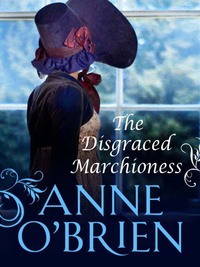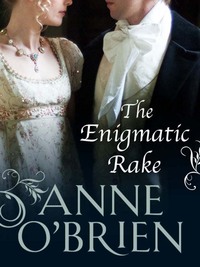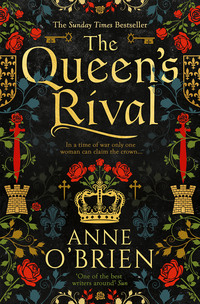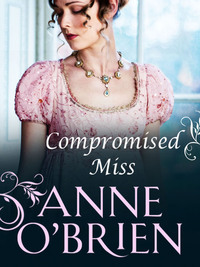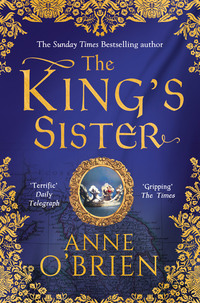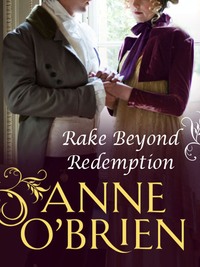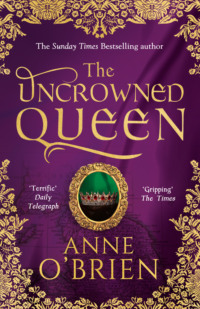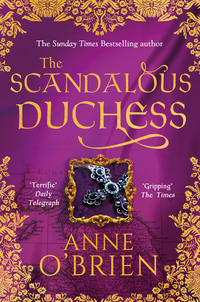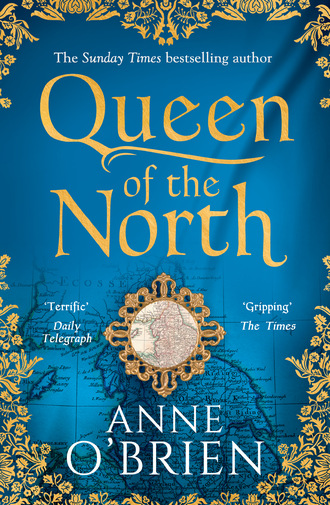
Полная версия
Queen of the North
I disliked being ignored. ‘And who is it that will be glad to see a Percy force at his gate?’ I asked. I sharpened the timbre of my voice a little to make my point. ‘Should I not know before you ride out from here if you will return on horseback or on a bier?’
Which produced a response from the Earl. ‘You are impertinent, madam.’
‘If it is the latter, sir,’ I continued, with even more impertinence, ‘I would wish to make provision for your interment.’
A little shiver blew over my skin as if someone had opened the window, an unpleasant sensation that was instantly dispelled by the Earl’s request, coldly trenchant, of his son.
‘Would you like to take your wife in hand?’
‘I would like to see him try,’ I said.
‘My wife does not need taking in hand.’ But Harry did wind his fingers with mine to draw me towards the doorway where, the door still ajar as the Earl had left it, he pushed me gently out through the arch.
‘Are you telling me to leave my own solar?’
‘Yes.’
‘Harry…!’
‘Not now. I will come to you.’
‘If you are to meet your doom, I deserve to know. I shall become a wealthy widow.’
‘I did not know you were so mercenary.’ He drew his knuckles down my cheek.
‘But yes. I have to be prepared for an uncertain future. A Mortimer widow retains a third of her husband’s possessions as her dower. I will be much sought after.’
He replied with a grin. ‘You will be a Percy widow, not a Mortimer one, with barely a rag for your back, and so unsought. I’ll try hard to save you from such an eventuality. Now go.’
I nodded my acquiescence, looking beyond him to where I caught the regard of the Earl. Something was afoot, something that was stirring the Earl’s aspirations, probably the opportunity to enforce his hold on another swathe of territory. Then the Earl’s eye slid from mine. Here, I acknowledged, was a deeper concern than the acquisition of more land, of more Percy prestige. And I still did not know who had made landfall at Ravenspur.
I would soon discover all. Would not Harry tell me? Without doubt he would. My skills at extracting news from a sometimes taciturn man had been honed to perfection. I would make him tell me by one means or another.
Who was I, Elizabeth Mortimer?
It was Harry’s pleasure, when he was in a chancy mood, to say that I was the product of a long line of marcher brigands and the self-seeking, arrogant, wily Plantagenets who would snap up anyone’s property, granted a fair wind. How, given that, would I be an easy wife to live with? Which was on the whole true. My father was Edmund Mortimer, Earl of March, one of the great marcher lords of the west with much land and many castles to his name. My mother was Philippa, daughter and only child of Lionel, Duke of Clarence, second son of King Edward the Third. Thus I was a desirable bride when the Earl of Northumberland had caught me in his marriage net for his eldest son. After all, was I not second cousin to the King himself, Richard the Second? The Earl had doubtless seen the value of my Plantagenet connections, as well as my Mortimer blood, from the very beginning.
For although my own family might own ambitions to extend their power, the Percy lords of the north were no less grasping. The Earl liked to appear as a rough and ready marcher lord who did not mince his words, one who was more ready to wield a sword than engage in well-bred niceties to hammer out an alliance or put an end to a dispute. What an astonishingly false image that was, for the Percys were as royally connected as I. The Earl’s father, another Henry Percy, had wed Mary, descended through the Dukes of Lancaster from King Henry the Third and his wife Alianore, which gave my father by law more than a taint of royal blood.
The Earl had been educated to know appropriate demeanour in the royal household of King Edward the Third and that of the King’s uncle Henry, Duke of Lancaster, with the result that the Earl, despite his occasional mummer’s antics, was a man who could adopt a courtly costume, chivalric manners and diplomatic speech worthy of any European ambassador. The Earl could apply a knife to his meat at a royal banquet with more sophistication than most. Woe betide any man who thought him nothing but a rude and ill-bred lout, even though it was on occasion easy to do so. This man who had dominated my solar with no apology was rarely questioned or thwarted; the years might be silvering his hair and beard but they had still to drain either his resources or his arrogance.
Nor was Harry, with whom I could claim a distant cousinship as well as a more intimate relationship, no more than a border brigand in dusty garb or well-worn armour, driven to exchange blows with any man who would entertain him. Harry was…
I considered it as he closed the solar door softly at my back.
Well, Harry was Harry, a man of some talent and much attraction.
I did not need Harry to inform me of the identity of the man who had landed in England. It took no time at all for me to deduce whose arrival had caused such a stir: there was only one deduction possible. Who else would make landing at Ravenspur, and in doing so fill the Earl’s eyes with bright speculation? It was Henry Bolingbroke, Earl of Hereford, and it had been a return much anticipated in some quarters and feared in others. His father, John of Gaunt, the old Duke of Lancaster, my grandfather’s brother, had been dead since February. Henry would surely return to reclaim his inheritance.
But it would not be an easy return.
When Richard had waged a vicious campaign against those who had had the temerity to shackle his power earlier in his reign, he had connived at the death of some, while banishing his cousin Henry Bolingbroke from English shores for six years as a foresworn traitor. On Lancaster’s death Richard had seen the opportunity to be permanently rid of an enemy. The terms of the banishment had been changed to lifelong exile, and the whole of the Lancaster inheritance had fallen into Richard’s hands for the use of the crown. Cousin Henry had been effectively exiled and disinherited.
And now he was back. I pursed my lips as I considered the repercussions.
All would depend on cousin Henry’s demeanour when he met with the hostile King. The problem of the inheritance and exile could be solved if Richard was prepared to be gracious and forgiving. Or a raging fire could be lit to ravage the country. The thought disturbed me, but not unmercifully. Family disputes had a habit of being settled, if not equably, at least to the satisfaction of both sides, when there was really no alternative but to come to a settlement. Would not the alternative in this case be war?
Harry found me without difficulty, where we always met to enjoy moments of privacy, even in this great castle with its vast array of infrequently used rooms. There would be no eavesdroppers here in the chamber in the Lion Tower, far from the Earl’s private space in the great chamber, with its excellent view of the castle environs and the River Coquet that encircled us in its gentle flow. Yet still Harry took care to hover, head bent, to listen at the door after he closed it, before turning to me, drawing his palms down his cheeks, wincing as they came in contact with the abrasion. In the intervening time, someone had tipped a ewer of water over his head, probably at his own bequest, so that his hair was damply clinging to his neck.
Our reunion, redolent of restored intimacy that had been destroyed in my solar, could not yet be resurrected. I regretted it, but there was an issue which must be addressed.
‘I’ll not apologise for the Earl.’ Harry was invariably honest.
‘There’s no need. He does not rank women highly.’
‘Apart from my mother, whose name remains engraved in gold in his memory.’
‘I will say nothing against her. She must have been a saint.’
Margaret Neville, older than the Earl at the time of their marriage and already a widow. He had not attained his earldom when he had wed Margaret and had valued a well-connected bride. She had carried five children and had been much mourned on her death when I was little more than a babe in arms. I suspected that Margaret held more importance for the Earl than the Blessed Virgin.
‘Never a saint, but a woman of steel-like will.’ Harry smiled briefly.
‘I’m sorry that I never knew her. But that’s not important.’
‘No.’ He studied me from under his emphatic brows, so like his father’s. ‘You know what it is. I think we’ve all been anticipating this day for the last six months.’
‘Of course I know,’ I admitted. ‘It is Bolingbroke.’
‘Yes. Or Lancaster as we must now remember to address him since the title came to him by legitimate right on Gaunt’s death, however much the King might dislike it.’
‘And he has not brought an army with him?’ I mused as I recalled the Earl’s derisory comment.
‘No.’
Harry was watching me. After all, Henry Bolingbroke, the Lancaster heir, being first cousin of my mother, was also claimed in as close a cousinship with me as was King Richard. It might be that family loyalties were about to become uncommonly stretched. Broken even. Glancing up, I knew exactly the content of Harry’s gaze, heavy on mine, the question openly being asked. Where would my own loyalties lie if a breaking did occur? I was too close to both to be objective in my cousinly appraisal. I knew them both. I held an affection for and a family duty to both. Glory of kingship would keep me loyal to Richard, the demands of justice would win my compassion for Henry. I hoped that I would never have to choose between one and the other. It could make for an agonising choosing.
And if a choice had to be made, where would the Percys stand?
I did not enjoy the breath of concern that stirred my thoughts.
‘What will Henry Bolingbroke do?’ I asked, rejecting Harry’s unspoken query, seeing his grimace as he acknowledged that I would, for a little while, keep my own counsel. ‘It can’t be a coincidence that he has chosen the perfect moment to break the terms of his banishment, when Richard is away in Ireland and so in no position to take action against him.’
‘No coincidence at all.’
Harry was now perched sideways on a window ledge, ruminating, digging his fingers into his scalp as if it would aid clarification.
‘Blessed Virgin, Harry! Are you going to tell me anything about Percy plotting?’
‘How can I tell you what I don’t know? I know what you will say,’ he replied shortly. ‘If we don’t know what he wants, is it wise to ride to Lancaster’s side? It all depends what his intentions are. And we won’t know until he tells us. And we won’t know that until we meet up with him.’
‘Whatever he tells you, is it wise to pin your banner to his? After all, Richard sent my cousin Henry into exile for life.’
And so he had, all because of the rebellious affair of the Lords Appellant when Richard’s infatuation with the charms of Robert de Vere had reached its apex, Richard endowing his favourite courtier with patronage, unable or unwilling to see the consequences. Resentment was stirred amongst five great magnates, my cousin Henry, the youngest of them, joining forces with Gloucester, Arundel, Nottingham and Warwick.
Harry was now staring out of the window. Where his attention was, I could not guess.
‘Are you listening to me?’ I asked.
‘I always listen to you, my purveyor of excellent advice.’
I would not respond to his innocent smile as he turned once more to face me, arms folded across his chest in a deceptive attitude of concentration.
‘Would that Richard had listened to excellent advice in his choice of friends,’ I added.
But he had not. The five Lords Appellant were driven to challenge royal power, resulting in a battle at Radcot Bridge, where they defeated the ill-starred de Vere, driving him into exile and forcing Richard into a bared-teeth compliance. The lords had emerged triumphant with their curb on the young King’s powers, but Richard had never forgiven them. As soon as he considered himself powerful enough, he set his sights on these lords, with devastating results. Gloucester was murdered in his bed in Calais; Arundel, my sister’s husband, executed; Warwick imprisoned; while Nottingham and my cousin Henry were banished from England. A notable coup over which Richard had preened. He would assuredly resist any attempt to overset it.
‘If my cousin Henry returns without royal sanction,’ I observed, holding Harry’s regard, ‘then that precious life of his will be forfeit. Richard already has you on his list of those with dubious loyalties after your recent outburst. When he returns from Ireland he will not let you go unpunished. He can be vicious when roused. His revenge on the Lords Appellant, as my poor sister is all too aware, was grim. Her husband’s death on Tower Hill was bloody and unnecessary. So if you are in collusion with Lancaster…’
‘If we are in collusion as traitors, then we are all under the shadow of the axe. We already are, for our sins.’
‘It was your own fault, Harry.’
‘It needed to be said. Richard has been too quick to trample on Percy authority. What’s more, I’d say it again tomorrow.’
‘And probably just as badly.’
Harry had found the need to express, in vivid and crude terms, his disapproval of King Richard’s flexing of royal muscles in the north, to the King’s displeasure. Meanwhile Harry’s expression had closed, leaving me in no doubt that he would not discuss the clash of opinion with King Richard that had left a lurking shadow over our family, so I abandoned it for a meatier subject that would draw Harry back to the matter in hand.
‘What do you think Lancaster will do?’
‘I think he will say that he has returned to take back the Lancaster inheritance and his title.’
I took note of the careful wording. ‘I’d be surprised if that’s all, whatever he says.’ I knew my cousin Henry better than that. He would never tolerate injustice. If he was the victim of such injustice, cousin Henry would be driven into action to right the wrong. Stepping behind him, I dug my fingers into Harry’s shoulder, making him flinch as I discovered a knot of taut muscle. Peeling back the cloth I discovered a newly scabbed-over cut. It had been a deep one. Another scar to add to the collection.
‘Knife?’ I asked conversationally to negate the familiar brush of fear that his life was so often in danger of being snuffed out.
‘Sword,’ he replied. ‘Before I took the weapon from its owner. He’ll not be needing it. And it was a poor weapon.’
Since there was nothing more for me to say, and it was healing cleanly, I returned to the simple, or not so simple, matter of treason.
‘Do you think my cousin Henry will claim the throne?’ I asked, deliberately ingenuous.
It was as if I had dropped an iron pan onto a hearthstone with an echoing clang to draw every eye. Harry’s shoulder acquired a rigidity under my hand.
‘Now there’s a dangerous question. What makes you ask that?’
‘Merely a thought.’
‘You never merely have thoughts. All I can say is that Lancaster will not be well disposed to Richard. Nor will he trust him.’ He grunted. ‘By the Rood, Elizabeth, have mercy. I swear the Scots could learn a thing or two from you about torturing prisoners.’
As I continued to knead, but more gently, I caught the slide of Harry’s eye to where he had left his sword propped beside the door, an elegant Italian weapon with a chased blade at odds with the soldierly hilt. Harry had brought it back from a tournament somewhere in his early travels, since when it had become his pride and joy, rarely leaving his sight except when exhaustion took him to his bed.
‘So tell me what is in your mind,’ I said, my fingers stilled at last, my thoughts waywardly turning into those dangerous channels.
‘Not a thing.’
‘You looked positively shifty.’
‘I am never shifty. My thought processes are as clear as a millpond. I was thinking what you are thinking. That Lancaster’s not the only one with a claim to the throne. I don’t recall Richard, childless as he is, and will be for some years, ever naming Lancaster as his heir.’
‘No, he would not. There’s too much antipathy between them. Wasn’t it Edward of Aumale whom he named, at the last count?’
Edward of Aumale was another distant cousin of mine, son and heir of Edmund, Duke of York. I had more than enough cousins to rustle the leaves of England’s royal tree.
‘Yes, Aumale has been given that honour, but before that, as I recall, until his unfortunate death in Ireland, the heir was recognised as your brother Roger, Earl of March.’
So we had reached that scenario at last, as I knew we would. The Mortimer claim to England’s crown. It might have been rejected by a fair-weather Richard in favour of Aumale who had become the recent recipient of Richard’s affections, but the Mortimer royal blood was still there, looming over the future succession of a childless King, as immutable as ever it had been. In the opinion of a goodly number, and in mine, my brother Roger had had a stronger claim to the throne than ever Henry of Lancaster did. A claim inherited by his son Edmund, my nephew. It was temptingly close, terrifyingly close. If Richard were to die without a son, the new King should be Mortimer. If Richard were no longer King by whatever means, the new King should be Mortimer.
Harry’s gaze, looking up and over his shoulder, held mine, daring me to make the Mortimer claim out loud. But I would not. Richard was King, and there was no question of his right to be so.
‘Except that Richard then promptly unrecognised Roger when he fell out of favour,’ I said lightly, ‘to replace him with Aumale.’
‘That’s what happens when your brother and your uncle were hand-in-glove with the Lords Appellant.’
‘Roger was not, as you well know. Roger was loyal to Richard all his life.’
In a travesty of justice, Roger had gained Richard’s enmity by refusing to arrest our uncle Sir Thomas Mortimer for his admittedly too-close connections with the Lords Appellant who had forced the King to bow to their demands for good government.
Harry was not to be deflected. ‘Yet there is still that strong, and dangerous, dose of Plantagenet blood running through the Mortimers. And your sadly deceased brother Roger has a son to take on that Mortimer mantle.’ He paused, removing a knife from his belt, testing its sharpness against his thumb as he escaped my ministrations and ranged the length of the chamber and back.
‘What are you saying?’ I asked as he returned to stand before me, frowning down at the weapon.
‘I am saying this. Lancaster is back, that we know. Would we be naive, Elizabeth, to believe that he would risk a return to England, to an even more serious charge of treason from a furious King, for the sole purpose of supporting the Mortimer claim to England’s crown before his own?’
‘Yes. We would be naive.’ Suddenly, as if a candle sconce had been lit, I had no doubt of cousin Henry’s ambitions. If it became a struggle for power between Lancaster and Richard, Henry would not have Mortimer interests uppermost in his mind.
‘Yet I would hear his own words on the matter,’ Harry said. ‘Lancaster is not, I think, a man without honour.’
‘So you might be willing to give him your support and the use of your retainers.’
‘I might.’
An image insinuated itself into my mind, which I forced myself to consider: of King Richard returning with an army from Ireland to discover a considerable Lancaster force awaiting him, prepared to engage in battle. We were used to war and skirmish year on year in this northern March, where the Scots encroached at every opportunity and the Percys pushed just as wholeheartedly back, but this new power being set up might mean something of a far greater magnitude. I wondered if I should be fearful. And decided that I should.
‘It sounds like war, Harry.’
He nodded. ‘If it is in Percy interests, I will consider it.’ The knife sliced through the skin, his blood red along the edge of his thumb, which he wiped on his sleeve. ‘I’ll fight to the death to preserve what we have and what we can get. We need a King who will see the value of our control of the north and allow us free rein to exert it. If we have such a King, then my loyalty is ensured. But any man who threatens our hegemony here in the north is an enemy, and I’ll act accordingly.’
There it was, engraved in the line between his brows and the stain of his blood, the words that would be engraved on Harry’s tomb. Ambition. Power. Suzerainty over the lands of the northern March.
I raised a smile in an attempt to dispel the thought, dragging my eye from the blood on his sleeve. ‘It seems to me that you have three choices,’ I said.
‘Only three?’
The knife tossed from right hand to left, Harry had snatched at my fingers and raised them to his lips. By the simple expedient of latching my fingers with his, I kept him beside me.
‘Three. Richard. Henry of Lancaster. My dead brother’s son Edmund Mortimer, Earl of March.’
Harry tilted his chin. ‘Go on.’
‘If Lancaster was of a mind to remove Richard… If he was of a mind to support the Mortimer claim as more important than his own and make my nephew King, albeit a very young one, where would your loyalties then lie?’ I paused momentarily to marshal my thoughts. ‘Not that I think there is any chance that Lancaster would do so. Why hold a golden crown in your hand in one breath and give it away in the next? If Lancaster ever seizes the crown from Richard’s head, he’ll hug it to his chest for ever. But if he did consider a Mortimer King, would you remain loyal to Richard, to the man to whom you vowed allegiance at his coronation? Or would you see opportunities elsewhere?’
Harry had become very still.
‘What are you suggesting, my wife?’
I considered whether I should speak what was in my mind, and decided to do so.
‘I am suggesting to you the advantages of having a Mortimer King. To have a Mortimer King of England, and one who is of no age to rule, might seem to some of our great magnates a desirable circumstance to embrace. To have a wife of Mortimer blood, as you have, would place you suddenly very close to the crown. A crown that would demand a regency and an influential council for the coming years. Such a powerful position is not one to be carelessly swept aside when you would be uncle by marriage to the young King. I suppose you have thought of all that.’
‘No. It has not crossed my mind.’
His face was supremely enigmatic. Harry was not without his talents, on or off a battlefield. Occasionally, when it suited him, dissembling was one of them.
‘And I suppose it did not cross the mind of the Earl, years ago, when he was negotiating marriage alliances for you?’
‘My father’s mind has a depth that I am often unable to plumb.’
‘And was my value as a Mortimer bride in your mind when you married me?’
‘Of course not.’
‘But it might well have been in your father’s!’
‘Well, it wasn’t in mine. You were eight years old.’
‘And you were fifteen and precocious.’ But I had long ago abandoned any bitterness, even if it had ever existed, that my marriage had been negotiated merely to make a worthy alliance between Mortimer and Percy. My lot had been no different from that of any royal daughter. Now it was just an effective weapon with which to needle Harry. ‘I swear it would be in your father’s mind, that at some point in the future it might be an asset to have a Mortimer wife for you, with royal Lionel’s blood directly in her veins. Your father snapped me up as a beggar would snatch at a gold coin he spied in the gutter. What an appealing alliance. What an opportunity for the future to catch a wife of royal blood, descended from the old King’s second son. I swear you were aware of it too.’
‘Of course I was,’ he capitulated at last, ‘and of course I have considered the possibility of a Mortimer King.’ He leaned swiftly to kiss the edge of my jaw before I could evade him. ‘Quite a catch indeed. All I wanted was the Plantagenet blood in my bed, when you were old enough for me to get you there.’ He became serious. ‘But in all honesty, Elizabeth, none of us could have seen this eventuality. There was no thought that we would have been left with Richard, unpredictable at best, dangerously capricious at worst, and no direct heir on the horizon after him. The child wife he has taken will be no good to him for many years.’


